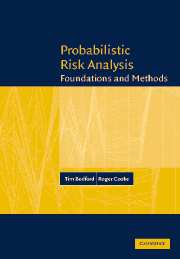Book contents
- Frontmatter
- Contents
- Illustrations
- Tables
- Preface
- Part I Introduction
- Part II Theoretical issues and background
- 2 What is uncertainty?
- 3 Probabilistic methods
- 4 Statistical inference
- 5 Weibull Analysis
- Part III System analysis and quantification
- Part IV Uncertainty modeling and risk measurement
- Bibliography
- Index
5 - Weibull Analysis
from Part II - Theoretical issues and background
Published online by Cambridge University Press: 05 June 2012
- Frontmatter
- Contents
- Illustrations
- Tables
- Preface
- Part I Introduction
- Part II Theoretical issues and background
- 2 What is uncertainty?
- 3 Probabilistic methods
- 4 Statistical inference
- 5 Weibull Analysis
- Part III System analysis and quantification
- Part IV Uncertainty modeling and risk measurement
- Bibliography
- Index
Summary
The Weibull distribution finds wide application in reliability theory, and is useful in analyzing failure and maintenance data. Its popularity arises from the fact that it offers flexibility in modeling failure rates, is easy to calculate, and most importantly, adequately describes many physical life processes. Examples include electronic components, ball bearings, semi-conductors, motors, various biological organisms, fatigued materials, corrosion and leakage of batteries. Classical and Bayesian techniques of Weibull estimation are described in [Abernathy et al., 1983] and [Kapur and Lamberson, 1977].
Components with constant failure rates (i.e. exponential life distributions) need not be maintained, only inspected. If they are found unfailed on inspection, they are ‘as good as new’. Components with increasing failure rates usually require preventive maintenance. Life data on such components is often heavily censored, as components are removed from service for many reasons other than failure. Weibull methods are therefore discussed in relation to censoring. In this chapter we assume that the censoring process is independent or random; that is, the censoring process is independent of the failure process. This may arise, for example, when components undergo planned revision, or are failed by overload caused by some upstream failures. In other cases a service sojourn may terminate for a reason which is not itself a failure, but is related to failure. When components are removed during preventive maintenance to repair degraded performance, we certainly may not assume that the censoring is independent.
- Type
- Chapter
- Information
- Probabilistic Risk AnalysisFoundations and Methods, pp. 83 - 96Publisher: Cambridge University PressPrint publication year: 2001



